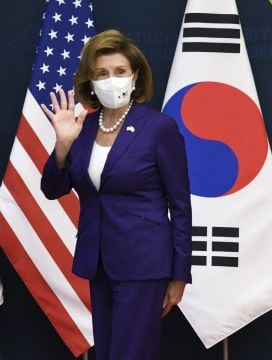US House or Representatives speaker Nancy Pelosi has met South Korean political leaders in Seoul but avoided making direct public comments on relations with China and Taiwan that could increase regional tensions.
Ms Pelosi, the first House speaker to visit Taiwan in 25 years, said on Wednesday in Taipei that the American commitment to democracy in the self-governing island and elsewhere “remains ironclad”.
In response, China on Thursday began military exercises, including missile strike training, in six zones surrounding Taiwan, in what could be the biggest of their kind since the mid-1990s.

After visiting Taiwan, Ms Pelosi and other members of her congressional delegation flew to South Korea — a key US ally where about 28,500 American troops are deployed — as part of an Asian tour that included earlier stops in Singapore and Malaysia.
She met South Korean National Assembly speaker Kim Jin Pyo and other senior members of parliament on Thursday.
After that hour-long meeting, Ms Pelosi spoke about the bilateral alliance, forged in blood during the 1950-53 Korean War, and legislative efforts to boost ties, but did not directly mention her Taiwan visit or the Chinese protests.
“We also come to say to you that a friendship, a relationship that began from urgency and security, many years ago, has become the warmest of friendships,” Ms Pelosi said in a joint news conference with Mr Kim.
“We want to advance security, economy and governance in the inter-parliamentary way.”

Mr Kim said he and Ms Pelosi shared concerns about North Korea’s increasing nuclear threat. He said the two agreed to support their governments’ push for denuclearisation and peace on the Korean peninsula based on both strong deterrence against Pyongyang and diplomacy.
Ms Pelosi and her delegation later spoke by phone with South Korean President Yoon Suk Yeol on the alliance, foreign policy and other issues.
Mr Yoon is on holiday this week, but critics accuse him of intentionally shunning a face-to-face meeting with Ms Pelosi in consideration of ties with China, South Korea’s biggest trading partner. Mr Yoon’s office said it had reviewed national interests.
In recent years, South Korea has been struggling to strike a balance between the US and China as their rivalry has deepened. Mr Yoon, a conservative, took office in May with a vow to boost South Korea’s military alliance with the US and take a tougher line on North Korean provocations.
On Thursday evening, Ms Pelosi flew to Japan for the final leg of her Asian tour.
Also on Thursday, the 10-nation Association of Southeast Asian Nations (Asean) called for calm in the Taiwan Strait, which separates mainland China and Taiwan, and urged the avoidance of any “provocative action”.

Asean foreign ministers, meeting in Phnom Penh, Cambodia, for a regional forum, said they were concerned the situation could “destabilise the region and eventually could lead to miscalculation, serious confrontation, open conflicts and unpredictable consequences among major powers”.
China’s foreign minister stressed his country’s efforts to strengthen ties with south-east Asian nations in talks with top diplomats from the Asean group.
Wang Yi stressed how China and the Asean countries had strengthened co-operation in recent years, adding: “We have safeguarded the oasis of peace in the face of the turbulence in the international security situation.”
Asean is made up of Brunei, Cambodia, Indonesia, Laos, Malaysia, Myanmar, the Philippines, Singapore, Thailand and Vietnam.
Ms Pelosi’s trip heightened US-China tensions more than recent visits by other members of Congress because of her position as leader of the House of Representatives. The last House speaker to visit Taiwan was Newt Gingrich in 1997.
China and Taiwan, which split in 1949 after a civil war, have no official relations but have multibillion-pound business ties.







